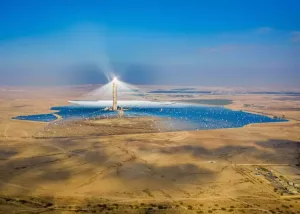Israel inaugurates its 4th solar field at the Ashalim concentrated solar power plant with an unprecedented energy price
The Government stressed that the cost is lower than the production of electricity using fossil fuels and is globally competitive.
Israel’s fourth solar field, located in Ashalim concentrated solar power plant, has started operations, setting an unprecedented price for electricity in the market.
Generating electricity at 8 agorot (2.2 euro cents) per kilowatt hour, this solar field offers a significantly lower rate than any other solar power plant in Israel.
This rate breaks records, compared to Ashalim’s first solar plant, which began operations at the end of 2017 at a cost of 40 agorot per kWh.
The Government stressed that the cost is lower than the production of electricity using fossil fuels and is globally competitive.
The government announcement confirmed that the fourth solar field in Ashalim is now ready to supply electricity to the grid, underlining the importance of solar projects for renewables in Israel.
Accountant General Yali Rothenberg emphasized that inter-ministerial cooperation is critical to achieving renewable energy targets and ensuring security in their implementation.
The Ashalim Solar Park and energy transformation
Ashalim already has two solar thermal power fields and one photovoltaic field, generating a total of 270 MW per year. With the new solar field, Ashalim now produces more than 300 MW per year.
Solar thermal power plants convert sunlight into heat, which is then used to generate electricity. In contrast, the photovoltaic system directly converts the sun’s rays into electricity.
The Government has the objective that 30% of the country’s electricity be generated through renewable energies by 2030, with solar energy as the protagonist.
Public-private partnership to advance renewable energy
The public-private partnership model establishes that the developer is responsible for the planning, financing, construction and operation of the solar field for 25 years, after which the property will be returned to the state.
Amir Shavit, president of the Electricity Authority, highlighted the relevance of this model to promote the production of renewable energy in line with government objectives.
The government is working on more projects, including another solar complex in Ashalim and one in the city of Dimona, with a total capacity of more than 700 MW.
EDF Renewables and the future of solar energy in Israel
EDF Renewables recently closed a financing agreement with the Harel Group for close to NIS 1 billion for seven solar projects in Israel, with a total capacity of 189 MW.
These advances mark an important milestone for solar energy in Israel and contribute to the transition towards a more sustainable and carbon-free future.



